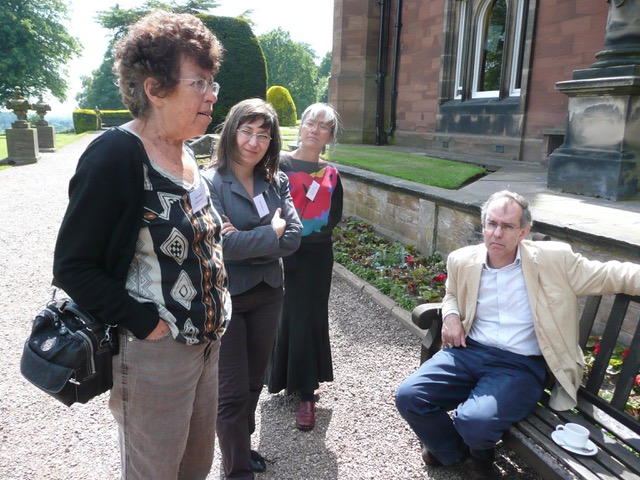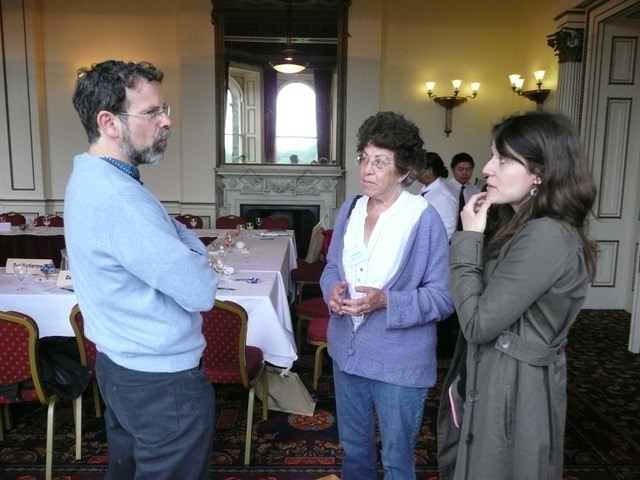Pnina Werbner: an Obituary
Claudia Liebelt, Free University of Berlin
Professor Pnina Werbner, 3 December 1944 – 17 January 2023
Pnina Werbner was a British social anthropologist, a brilliant thinker and engaged intellectual renowned for her prolific contributions to debates on Sufi Islam, multiculturalism and diaspora, as well as urban and legal anthropology. In January 2023, she died unexpectedly during a holiday with her husband, the anthropologist Richard Werbner.
Born in South Africa in 1944, Pnina immigrated to Israel with her parents when she was six years old. She obtained her bachelor’s and master’s degrees in English literature and philosophy from the Hebrew University in Jerusalem and in sociology & social anthropology from Tel Aviv University before moving to Manchester in 1970. In 1976, she received her doctorate from the University of Manchester, where she had studied with the late Max Gluckman, the South African social anthropologist and founder of the Manchester School, who also happened to be her uncle. She joined the University of Keele faculty in 1997 and became a full professor of social anthropology in 2001.

For more than five decades, Pnina Werbner studied Muslim South Asians in Britain and Pakistan, research that spanned different themes and places, and was published as the so-called Migration Trilogy: three single-authored books entitled The Migration Process (1990, 2002b), Imagined Diasporas among Manchester Muslims (2002) and Pilgrims of Love (2005).
In her publications, British South Asians are presented not as part of encapsulated immigrant communities, but as creative agents of complex and transformative lives in a diaspora, engaged in border-crossing journeys and networks of mutual support and gifting. Engaged in intellectual debates with many postcolonial theorists and feminist thinkers, Pnina Werbner wrote about the translocation of culture, the gendered experiences of migrant women and citizenship, as well as the role of imagination, sensual embodiment and creativity in the migration process long before these topics became more widely addressed in social and cultural anthropology. As a public intellectual, she prominently spoke out against essentialist thinking and the ‘failure’ of multiculturalism, offering, for example, a nuanced reading (1996) of the so-called Rushdie affair following the publication of The Satanic Verses (Rushdie 1988). She famously interpreted the protests sparked by the publication as a clash between different aesthetic grammars – an Islamic aesthetic of the Sublime and a secular-modernist narrative style – calling for a multiculturalist ‘politics of recognition’ rather than a blind enforcement of ‘freedom of speech.’
More recently, she co-edited The Political Aesthetics of Global Protest: The Arab Spring Uprisings and Beyond (with K. Spellman and M. Webb 2014), authored The Making of an African Working Class: Politics, Law and Cultural Protest in the Manual Workers Union of Botswana (2014) and, together with her husband Richard Werbner, African Customary Justice: Living Law, Legal Pluralism, and Public Ethics (2022). She continued to travel and publish, regularly attending academic conferences as well as the University of Manchester’s departmental seminar on Mondays. Her lists of publications, awards, honours, and grants are long.

In her academic work, Pnina Werbner often stressed the embodied and sensual aspects of social interaction, the ‘creativity and transgressive “fun” of […] everyday life’ (Liebelt and Werbner 2018: 3), among the female migrants or the (trades union) activists she studied and worked with. Pnina herself invested much in creating an inspired, vibrant and fun intellectual community, for example, by co-organising the longstanding annual Lake District Pakistan Workshop. Her and her husband Dick’s house south of Manchester functioned as a place where scholars of different generations came together for celebrations and lively conversations over delicious food. For me, Pnina’s house became like a home away from home after I started working as her research assistant within the framework of an AHRC-sponsored project on ‘Sociality, Caring, and the Religious Imagination in the Filipina Diaspora’ (2007-2010).
Pnina Werbner was an energetic and visionary spirit and – according to one speaker during a wake organised for her in early March 2023 – a force to be reckoned with. In 2006, she single-handedly organised the ASA UK Diamond Jubilee Annual Conference at the University of Keele after a dispute over organisational matters.
She is remembered by colleagues and former students for her intellectual generosity, humour and warmth. For them, she was utterly supportive, almost motherly, and an intellectual sparring partner in the best sense of the term.
RIP, Pnina – you will not be forgotten.
About the author
Claudia Liebelt is professor of social and cultural anthropology at the Free University of Berlin. Her research foci are the anthropology of the body and the senses, gender and sexualities, political anthropology and religion in the Middle East and Turkey. She has authored Istanbul Appearances: Beauty and the Making of Middle-Class Femininities in Urban Turkey (2023) and Caring for the ‘Holy Land’: Filipina Domestic Workers in Israel (2011).
References
Rushdie, S. (1988), The Satanic Verses (London: Viking).
Werbner, P. (1990), The Migration Process: Capital, Gifts and Offerings among British Pakistanis (Oxford & New York: Berg).
Werbner, P. (1996), ‘Allegories of Sacred Imperfection: Magic, Hermeneutics, and Passion in The Satanic Verses’, Current Anthropology 37, Supplement (February): S55–S86.
Werbner, P. (2002a), Imagined Diasporas among Manchester Muslims: the Public Performance of Pakistani Transnational Identity Politics (Oxford: James Currey).
Werbner, P. (2002b), The Migration Process: Capital, Gifts and Offerings among British Pakistanis, 2nd edn (Oxford and New York: Berg).
Werbner, P. (2003), Pilgrims of Love: the Anthropology of a Global Sufi Cult (London: Hurst).
Werbner, P. (2014), The Making of an African Working Class: Politics, Law and Cultural Protest in the Manual Workers Union of Botswana (London: Pluto).
Liebelt, C. (2011), Caring for the ‘Holy Land’: Filipina Domestic Workers in Israel (New York: Berghahn).
Liebelt, C. (2023), Istanbul Appearances: Beauty and the Making of Middle-Class Femininities in Urban Turkey (Syracuse: Syracuse University Press).
Liebelt C. and P. Werbner (2018), ‘Gendering ‘Everyday Islam’: an introduction’, Contemporary Levant 3, no. 1: 2–9.
Werbner, P., M. Webb and K. Spellman-Poots (eds) (2014), The Political Aesthetics of Global Protest: The Arab Spring Uprisings and Beyond (Edinburgh: Edinburgh University Press).
Werbner P. and R. Werbner (2022 [2021]), African Customary Justice: Living Law, Legal Pluralism, and Public Ethics (London: Routledge).